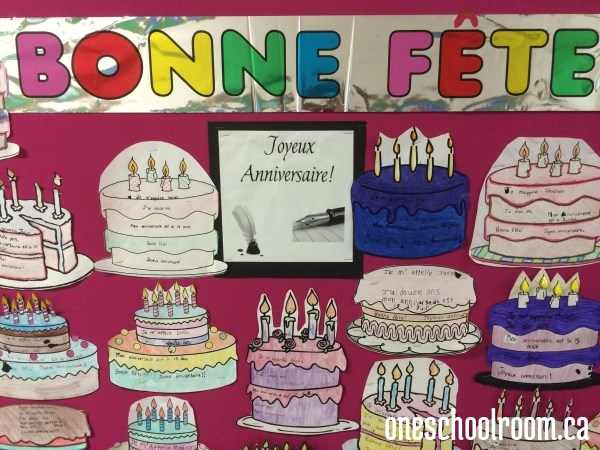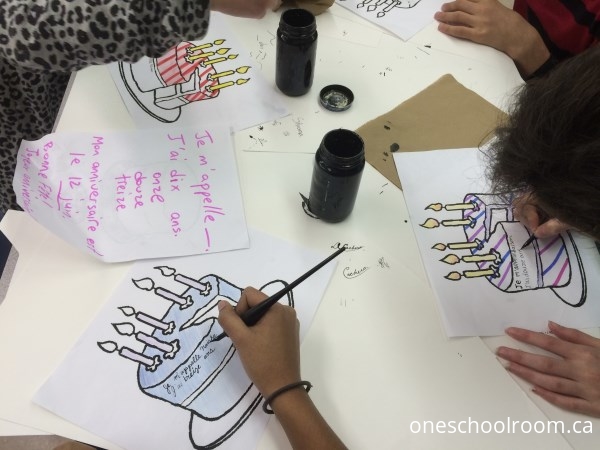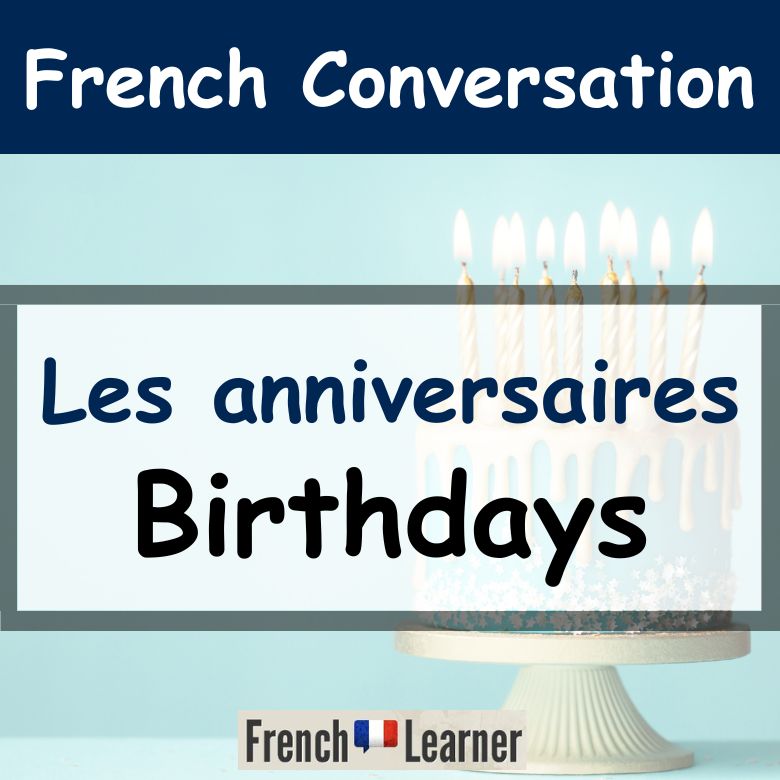My Birthday / Mon Anniversaire French Lesson
by Ms Campbell | Jan 31, 2016 | French


Lesson – Mon Anniversaire French Lesson
- Students will learn the months of the year. janvier, février, mars, avril, mai, juin, juillet, août, septembre, octobre, novembre, décembre
- Students will learn how to discuss their and their classmates’ birthdays. Quelle est la date de ton anniversaire? Mon anniversaire est le (number) (month).

On of the topics we enjoy talking about the most is our birthdays. In this conversation dialogue you can practice asking and answering lots of questions concerning birthdays in French.

1) Quelle est la date de ton anniversaire ? What’s the date of your birthday?
2) Comment est ce que les gens fêtent les anniversaires dans ton pays ? How do you celebrate birthdays in your country?
3) Comment aimes tu fêter ton anniversaire? How do you like to celebrate your birthday?
4) Est ce que tu te souviens de ton anniversaire le plus heureux ? Quand est ce que c’était? Can you remember your happiest birthday? When was it?
5) Est ce que tu te souviens d’un anniversaire malheureux? Quand est ce que c’était? Can you remember an unhappy birthday? When was it?
6) Est-ce qu ’on t’a déjà organisé une fête d’anniversaire surprise? Est ce que tu as préparé une fête d’anniversaire surprise pour quelqu’un d’autre? Has anybody ever made you a surprise birthday party? Have you ever made a surprise birthday party for somebody else?
7) Quel est le plus beau cadeau que tu aies reçu pour ton anniversaire? What’s the nicest gift you’ve ever received for your birthday?
8) Est ce que tes parents t’ont organisé des fêtes d’anniversaire quand tu étais petit(e)? Did your parents make you birthday parties when you were little?
9) À ton avis atteindre les grands anniversaires (40, 50, 60) est une expérience heureuse ou déprimante? Do you think reaching big birthdays (40, 50, 60) is a happy or despressing experience?
10) À ton avis quel est le meilleur âge? In your opinion what’s the best age?
11) Est ce que tu as jamais oublié l’anniversaire de quelqu’un dans ta famille ou d’un ami proche? Have you ever forgotton the birthday of somebody in your family or a close friend?
12) Quels étaient les évènements les plus importants de ton année de naissance? What where the most important events of the year of your birth?
13) Est ce qu’il y a quelqu’un célèbre qui a le même anniversaire que toi? Is there anybody famous who has the same birthday as you?
14) Est ce que les anniversaires sont vraiment importants pour toi? Oui ou non et pourquoi? Are birthdays really important for you? Yes or no and why?
15) Est-ce que tu préfères offrir un cadeau ou de l’argent pour un anniversaire? Do you prefer to give a gift or money for a birthday?
16) Est-ce que tu préfères passer ton anniversaire tout(e) seul(e) ou avec des amis ou des membres de ta famille? Do you prefer to spend your birthday alone or with members of your family?
17) Comment est ce que tu passerais un anniversaire idéal? What would you spend an ideal birthday?
18) Quelles activités est ce que tu aimes faire pour un anniversaire? What activities do you like to do for a birthday?
French conversation lessons | Lessons by David Issokson

Sharing is caring!
David Issokson
David Issokson is a lifelong language learner and speaks over seven languages. Of all the languages he speaks, he's the most passionate about French! David has helped hundreds of students to improve their French in his private lessons. When not teaching or writing his French Word of the Day lessons, David enjoys his time skiing, hiking and mountain biking in Victor, Idaho.
See all posts by David Issokson

How to say happy birthday in French (and the mistakes to avoid)
May 2, 2022
This article contains affiliate links. This means French Together may earn a commission for purchases made through these links. Read our full affiliate disclosure .
There are some cultural details we take for granted. If you’ve ever celebrated classmates’ birthdays in your French class, or seen a French movie or TV show where there was a birthday ( un anniversaire ), you might think you’ve got French birthday traditions down pat.
Then there may come a day when you’re invited to a French person’s birthday, or even that you’re the one planning it. This may be when you realize that there are some details about celebrating birthdays in France that may surprise you.
Let’s discover how to say happy birthday in French and discover the differences between French birthday celebrations and birthday celebrations in other cultures.
Joyeux anniversaire
Joyeux anniversaire is the most common birthday greeting in French.
It can be confusing for us anglophones, of course, because the word anniversaire makes us think of a wedding anniversary ( anniversaire de mariage in French).
When it comes to anniversaire as a birthday, simply think of it as the anniversary of the day you were born.
Bon anniversaire
Some people prefer this less common alternative. There is no particular reason; Bon anniversaire isn’t more or less formal than Joyeux anniversaire , for example. I think it’s just a personal vocabulary choice. That said, if you’re looking for a French birthday card or decorations, you may have to look a little harder to find this phrase.
Whether you choose to use “bon anniversaire” or “joyeux anniversaire”, you can also make the phrase more formal by saying “je vous souhaite un bon/joyeux anniversaire” (I wish you a happy birthday.)
The Canadian happy birthday
Joyeux anniversaire or bon anniversaire are the standard ways to wish someone happy birthday in French. But if you’re studying Canadian French ( Quebecois) or just want to extend birthday wishes to a French-Canadian friend, you would say Bonne fête – literally, “Good party/celebration”.
That seems pretty straightforward, but if you’re also communicating with French speakers from other places, be careful: Bonne fête has a completely different meaning in other parts of the francophone world.
If you say “ Bonne fête ” to a French speaker who isn’t from Canada, they’ll think you’re referring to their saint’s day. Also known as a “name day” in English, this is the feast day of the saint whose name they share. For example, if you have a friend named Julien, his saint’s day is August 2.
As you might imagine, these days aren’t arbitrary – they come from a calendar that was devised by the Catholic church and has been used for centuries (with a few new saints added and more modern names included over time).
Some families, especially practicing Catholics, will celebrate someone’s name day like a mini birthday, with a cake, for example, although not a big party or presents. Other people will simply say Bonne fête! to the person whose name day it is. And of course, France is no longer run by the Church, and is a secular, multicultural society, so many people don’t celebrate their saint’s day at all.
Still, lots of completely secular promotional or even official calendars do include the saint’s name for each day, and many non-religious television stations and newspapers will mention the name of the day’s saint.
You can click here to see a very typical (like, so typical that I more or less have the same one taped to my refrigerator here in Paris) mini calendar that has saints’ names alongside completely non-religious things like school vacation periods.
Other ways to say “Happy Birthday” in French

If you want to pull out all the stops and say more than a simple phrase, an internet search like “ façons originales de dire ‘joyeux anniversaire’ ” is a good idea. Lots of sites will give you some eloquent phrases or quotations to use.
Or, if you want to create your own birthday message, you could start with Joyeux anniversaire (or whichever variant you prefer) and then add something you wish for the person – for example: Joyeux anniversaire ! Que du bonheur pour cette prochaine année de vie . ” (Nothing but happiness in this next year of your life) or something you appreciate about them: Joyeux anniversaire à un super copain (Happy birthday to an awesome friend).
Happy belated birthday in French
It’s kind of reassuring that the French have a few ways to say “Happy belated birthday” – it shows that this kind of thing happens in other cultures, too, even if it’s not ideal. We’re all human.
The simplest way to wish someone a happy belated birthday in French is Joyeux anniversaire, avec un peu de retard (literally, “Happy Birthday, with a bit of lateness”).
You’ll also sometimes hear or read Bon anniversaire tardif, but this is not as common and doesn’t seem to have a pleasant ring to it for French-speakers.
How do the French celebrate birthdays?
Now that we’ve learned what to say for a French person’s birthday, how do you celebrate it? Here are some specific details that may make French birthday celebrations different from ones in your native culture:
What you sing at French birthdays
A typical French birthday celebration is like most birthday celebrations in the Western world: There’s cake and often presents (especially if the person celebrating their birthday is a child). The birthday boy or girl blows out candles ( bougies ) after the guests sing the French version of Happy Birthday to You (or, in Canada, a very pretty song sung to the tune of the Quebecois national anthem, which is linked to in this very informative article ).
The birthday song in French is the same tune as the one in English, but with the words in French ( bien sûr! ): Joyeux anniversaire, joyeux anniversaire, joyeux anniversaire [name], joyeux anniversaire! You can hear it here .
Interestingly, in the French version of Happy Birthday to You , sometimes the person’s name isn’t sung. I’m not sure that there’s a particular reason for this; I’ve heard it at family gatherings as well as larger parties where you might think that maybe not everyone knows the birthday person’s name, so it doesn’t seem to be tied to that.
There is another version of Happy Birthday to You in French with different lyrics , but while it’s the most common one you’ll find on YouTube, I’ve personally never heard it sung at any of the many French birthday parties I’ve been to over the years.

The cake ( le gâteau )
The big difference that I’ve noticed with French birthday parties, whether they’re for kids or adults, is that they tend to be more lowkey than in some other countries, very much including my native country, the US. This is especially true when it comes to the cake.
The French don’t use icing or make elaborate birthday cakes. Many French people consider icing to be écoeurant (disgusting) and prefer a subtler taste and look for their birthday pastries. It’s very common to have a simple, homemade cake with no icing and minimal (if any) decorations at a birthday party, especially if it’s for kids. A grown-up’s party would usually feature a freshly baked cake bought from a good local boulangerie . Often, there will be a fruit tart instead.
If you like cake, the good news is, these options are still delicious – just different than what you might be expecting if colorful cakes with icing and designs are the norm in your culture.
The presents ( les cadeaux )
If you’re invited to a French birthday party, you might be wondering what kind of gift to get. Are there traditional French birthday gifts?
If the party is for a kid, I often get in touch with the parents to ask what they might want. Some parents seem a bit embarrassed by this and will only give you vague answers, but others will at least tell you what the kid is interested in. You’re generally not expected to buy anything very expensive or elaborate. For example, at a recent birthday party my son was invited to, we bought the guest of honor, a fan of Star Wars, a lightsaber toy.
For adults, you can obviously choose something based on what the person likes, but if you don’t know them well, some kind of quality food or drink offering (most typically a bottle of wine or a box of high-end chocolates) is always appreciated. If you come from another culture, you could offer them a quality product from yours, if you think they’d appreciate that. But wine, chocolates, or flowers are excellent go-to’s.
Gift cards don’t seem to be as popular in France as they are in some other cultures. I think this is due to the French finding it rude to talk about or bring up money (although money is the common, traditional gift at French weddings).
Venues, dress code, French birthday cards, and other details
In France, theme parties or parties hosted at special venues don’t seem very popular. Instead, most of the birthday parties I’ve been to have been held at people’s homes or (for kids’ birthdays) at local parks.
Fancy decorations or and getting dressed up also aren’t the norm, whether for adults or children.
In France, birthday cards tend to be sent by mail from people who aren’t present at the party, rather than given with gifts.
For adult birthdays, it’s common to toast with champagne , although this definitely depends on the context – a twentysomething celebrating with friends might opt for something harder, for example.
Of course, all of this depends on the person, their family/friends, social class, tastes, and so on. But as a general rule, it’s what you can expect if you’re invited to a French birthday party.
The essential thing to know about French birthday celebrations is that they tend to be on the simple side
If you’re from a culture where that’s not the case, you might worry that this will feel a bit lackluster, especially if you’re planning a party for a French loved one. Over time, though, I’ve come to really appreciate simple French birthdays in their own right. There’s a sincerity and a less artificial feel to them.
In a way, birthday parties are a moment where even the most sophisticated French people show a down-to-earth side. It’s a way to get back to what a birthday is really about: celebrating someone’s presence in the world.
You are using an outdated browser. Please upgrade your browser or activate Google Chrome Frame to improve your experience.
“Happy Birthday” in French Plus Related Vocabulary
Want to wish someone a happy birthday in French? Simply say Joyeux anniversaire !
But “happy birthday” isn’t the only phrase worth knowing. Read on to learn common expressions to wish everyone from your mom to your boss a joyful celebration. You’ll also learn common birthday vocabulary words, hear a few variations on the birthday song in French and learn some French birthday traditions.
Joyeux Anniversaire: “Happy Birthday” in French
More ways to say “happy birthday” in french, birthday vocabulary and phrases, the happy birthday song in french, birthday traditions in france, and one more thing....
Download: This blog post is available as a convenient and portable PDF that you can take anywhere. Click here to get a copy. (Download)
The main way to say “happy birthday” in French is :
Joyeux anniversaire ! — Happy birthday!
Joyeux means “happy” or “joyful,” while anniversaire means “birthday.”
Straightforward and simple. You can’t go wrong with this one in any situation!
But of course, this isn’t the only way to wish someone a happy birthday in French. Read on for more!

There’s a birthday wish for every situation. Here are some lovely birthday wishes for friends, relatives and everyone in between:
- Bon anniversaire — Happy birthday
- Joyeuse fête — Happy celebration
- Heureux anniversaire — Happy birthday
- Meilleurs vœux pour ton anniversaire — Best wishes for your birthday
- Que cette journée soit remplie de joie — May this day be filled with joy
- Passe une merveilleuse journée d’anniversaire — Have a wonderful birthday
- Je te souhaite un joyeux anniversaire — I wish you a happy birthday
- Que tous tes vœux se réalisent — May all your wishes come true
- Profite de chaque instant de cette journée spéciale — Enjoy every moment of this special day
- Que ton chemin soit parsemé de joie et de succès — May your path be filled with joy and success
- Je te souhaite une journée pleine d’amour et de rires — I wish you a day full of love and laughter
- Je t’envoie mes meilleurs vœux pour ton anniversaire — I send you my best wishes for your birthday
- Que cette journée soit spéciale à tous égards — May this day be special in every way
- Je te souhaite une vie remplie de bonheur et de succès — I wish you a life filled with happiness and success
- Que chaque instant de cette journée soit mémorable — May every moment of this day be memorable
- Je te souhaite une journée lumineuse et radieuse — I wish you a bright and radiant day
- Que cette journée soit à ton image, spéciale et unique — May this day be like you, special and unique
- Je te souhaite une journée magique et inoubliable — I wish you a magical and unforgettable day
- Je te souhaite une journée merveilleuse entourée de ceux que tu aimes — I wish you a wonderful day surrounded by loved ones
- Que cette journée soit le début d’une nouvelle aventure pleine de bonheur — May this day be the beginning of a new adventure full of happiness
- Je te souhaite une journée remplie de sourires et de beaux souvenirs — I wish you a day filled with smiles and beautiful memories

Do you want to invite a French-speaking friend to your birthday party, or propose a toast over a delicious birthday cake? You’ll need to add some birthday vocab to your belt. Discover all the words you need to know to talk about birthday celebrations!
- Fêter son anniversaire — To celebrate one’s birthday
- La date de naissance — Date of birth
- Le gâteau d’anniversaire — Birthday cake
- Les bougies — Candles
- Les cadeaux — Gifts
- Les ballons — Balloons
- La fête d’anniversaire — Birthday party
- L’invitation — Invitation
- La surprise — Surprise
- La fête surprise — Surprise party
- L’âge — Age
- Souffler les bougies — Blowing out the candles
- Le chant d’anniversaire — Birthday song
- Le message d’anniversaire — Birthday message
- Les souhaits d’anniversaire — Birthday wishes
- La carte d’anniversaire — Birthday card
- Le toast — Toast
- La réunion de famille — Family gathering
- Les amis — Friends
- Les jeux d’anniversaire — Birthday games
- Les félicitations — Congratulations
- L’anniversaire de naissance — Birth anniversary
- La célébration spéciale — Special celebration
- Les invités — Guests
- Le champagne — Champagne
- Les décorations — Decorations
- Les chants et les danses — Songs and dances
- Les souhaits exaucés — Wishes come true
You can sing the French version of the traditional English birthday song. The lyrics are simple enough to remember, as long as you recall the official way to say “happy birthday” in French:
Joyeux anniversaire, (Happy birthday) Joyeux anniversaire, (Happy birthday) Joyeux anniversaire [name], (Happy birthday [name]) Joyeux anniversaire. (Happy birthday.)
You can hear it here:
There are other, more traditional songs you can sing to wish someone a festive happy birthday in French. This traditional song has more to it than just the same words repeated over and over:
You can follow along with the subtitles in the video, or read them and two other French birthday song variations in this blog post:
Like cake and ice cream, happy birthday song in French comes in multiple flavors. Click here to learn the four most popular versions of the French birthday song. Learn how…
FluentU takes authentic videos—like music videos, movie trailers, news and inspiring talks—and turns them into personalized language learning lessons.
You can try FluentU for free for 2 weeks. Check out the website or download the iOS app or Android app.
P.S. Click here to take advantage of our current sale! (Expires at the end of this month.)

Try FluentU for FREE!

You’re almost ready to celebrate a birthday the French way. But first, take a look at some of these French birthday traditions to make sure you’re doing it right!
- Birthday breakfast: It’s common for family members to surprise the birthday person with a special breakfast of pastries, croissants, fresh fruit and a coffee or hot cocoa.
- Birthday flowers: Giving flowers, particularly bouquets or arrangements, is a customary gesture in French birthday celebrations. Popular choices include roses, lilies and mixed seasonal blooms.
- Les étrennes : In France, it’s customary to give kids and young adults small monetary gifts called étrennes on birthdays, New Year’s Day and other special occasions.
- Unlucky numbers: Some French people believe that certain numbers are luckier than others. When gifting flowers, make sure to give odd numbers!
- Carte d’Or : Another unique tradition is the Carte d’Or or “Golden Card.” These are special handmade cards, often decorated with gold accents and personalized messages, to commemorate milestone birthdays like 18th or 21st birthdays.
- Ear tugging: A lighthearted and playful tradition involves gently tugging the earlobes of the birthday person, usually as many times as their age, to symbolize good luck and longevity.
- Extended celebrations: Birthdays in France are often celebrated beyond just one day. It’s common for the birthday person to extend the celebration by organizing a meal or get-together with friends or family a few days before or after the actual birthdate.
- Toasts and speeches: During birthday celebrations, it’s customary for family and close friends to make toasts and speeches to honor the birthday person.
Thanks to all these phrases, songs and traditions, you’re all set to celebrate someone’s birthday—or maybe even your own birthday!—in French. Have fun!
FluentU has a wide variety of great content, like interviews, documentary excerpts and web series, as you can see here:

FluentU brings native French videos with reach. With interactive captions, you can tap on any word to see an image, definition and useful examples.

For example, if you tap on the word "crois," you'll see this:

Practice and reinforce all the vocabulary you've learned in a given video with learn mode. Swipe left or right to see more examples for the word you’re learning, and play the mini-games found in our dynamic flashcards, like "fill in the blank."

All throughout, FluentU tracks the vocabulary that you’re learning and uses this information to give you a totally personalized experience. It gives you extra practice with difficult words—and reminds you when it’s time to review what you’ve learned.
Start using the FluentU website on your computer or tablet or, better yet, download the FluentU app from the iTunes or Google Play store. Click here to take advantage of our current sale! (Expires at the end of this month.)
Related posts:

Emotions in French: 36 Words and Phrases To Express Your Feelings

How to Say What in French: The 7 Essential Terms
Reply to this review cancel.
Thanks for choosing to leave a comment. Please keep in mind that all comments are moderated according to our comment policy , and your email address will NOT be published. Please Do NOT use keywords in the name field. Let's have a personal and meaningful conversation.
Recent Articles

The French Present Participle

The French Conditional Mood: Usage, Formation and Tips

The French “R”: 3 Ways to Nail Pronunciation
Enter your e-mail address to get your free pdf.
We hate SPAM and promise to keep your email address safe


IMAGES
VIDEO
COMMENTS
In this French Story: Mon anniversaire - we are talking about my birthday, cake, waterfalls, deer, goats, and games! Boost your French vocabulary and your French listening skills with this story in slow French, including a free PDF.
Мой День рождения. Mon anniversaire. Dans la vie humaine il existe les jours bons et mauvais qui se succèdent. Bien sur, pour que la personne soit heureuse la quantité de jours pleins de bonté doivent être dominante. Un de tels jours – …
Objective: Students will learn the months of the year. janvier, février, mars, avril, mai, juin, juillet, août, septembre, octobre, novembre, décembre. Students will learn how to discuss their and their classmates’ …
In this conversation dialogue you can practice asking and answering lots of questions concerning birthdays in French. Questions. 1) Quelle est la date de ton anniversaire? What’s the date of your birthday? 2) Comment est ce que les …
Joyeux anniversaire or bon anniversaire are the standard ways to wish someone happy birthday in French. But if you’re studying Canadian French ( Quebecois) or just want to extend birthday wishes to a French …
For many French learners, the word anniversaire is perhaps most with associated with the expression Joyeux anniversaire but it can also refer to un anniversaire de …
Introductory lesson on birthdays/how to ask for birthdays in French. student to then work in pairs to create their own conversation on this.
Mon anniversaire/My birthday in French. Subject: French. Age range: 11-14. Resource type: Game/puzzle/quiz. File previews. ppt, 108.5 KB. Introductory lesson on birthdays/how to ask for birthdays in French. Pupils to …
Joyeuse fête — Happy celebration. Heureux anniversaire — Happy birthday. Meilleurs vœux pour ton anniversaire — Best wishes for your birthday. Que cette journée soit remplie de joie — May this day be filled with …